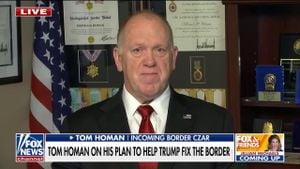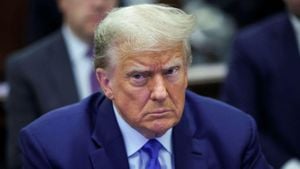Following the recent electoral shift, discussions surrounding Donald Trump's legal challenges and political future are reaching fever pitch. With the clock ticking down to his potential presidency, Trump is leveraging recent developments to reshape narratives around his past legal woes, particularly those related to the events of January 6, 2021. Legal analysts and political strategists are closely examining how these cases will play out as he navigates the complex political terrain of 2029 and beyond.
CNN’s senior legal analyst Elie Honig recently emphasized a significant point: the dismissed legal cases against Trump may not be revisited after he leaves office. This insight arose after Judge Tanya Chutkan granted Special Counsel Jack Smith's request to dismiss the election subversion case against Trump, aligning with the Department of Justice (DOJ) precedent of not prosecuting sitting presidents. Honig pointed out the long-term nature of politics and the likelihood of any prosecution being highly unlikely four years from now.
“Yes, technically the cases were dismissed without prejudice,” Honig explained. “That means someone could come back and reinstitute these charges, but it’s unlikely. Four years from now is practically forever. Whoever the next president is will likely have no appetite to bring these cases back.” The dismissal offers Trump more room to breathe as he focuses on his future political ambitions.
With the Supreme Court ruling granting presidents immunity for actions taken during their presidency, and with Trump’s future actions remaining unpredictable, the possibility of him issuing himself some form of pardon is on the table. This would mark unprecedented territory and underline the complexity and uncertainty surrounding his legal situation.
On the other end of the spectrum, Trump's legal team had initially requested the case be dismissed on the grounds of 'absolute immunity,' which the Supreme Court is set to deliberate on. With stakes this high, the consequences ripple throughout the political universe. Invoking historical arguments about presidential immunity helps Trump unite his divides and consolidate his supporters.
Adding to the intrigue is the special counsel's proactive engagement with the DOJ shortly after Trump's electoral win. Smith has requested Judge Chutkan pause all deadlines for the election interference case, allowing for more strategic planning from the prosecution's side. This pause could reflect either caution or hesitation as both sides contemplate their next moves amid the changing political winds.
While Trump contemplates his road to the presidency, critiques also surface, particularly aimed at Vice President Kamala Harris, who has faced intense scrutiny for her ambition to re-enter the political arena. Political analyst Mark Halperin suggested Harris should have demonstrated self-awareness by steering clear of a race against Trump. Halperin expressed the belief on “The Chris Cuomo Project” this week, arguing Harris underestimated the political risks involved.
Halperin underscored the challenges Harris faces due to the Biden-Harris administration's record. “Anyone else isn’t going to have to defend the Biden-Harris record,” he argued, proposing this as one of the factors hampering Harris's ability to garner support as the administration's struggles come to the forefront during her campaign.
While Halperin’s claims fuel hot debates about Harris's qualifications, public perception remains divided, particularly as Trump bustled back to the spotlight with calls to pardon January 6 participants, reigniting key portions of his base's support. Resurfacing legal challenges and political conflicts characteristic of the Trump era influence narratives shaping the 2024 election.
A more sensitive subplot includes the recent shocking incident involving Ryan Routh, who has been accused of attempting to assassinate Trump at his golf club. A recent piece by Politico has drawn criticism for downplaying the influence of leftist rhetoric on Routh, who articulated his grievances reflecting sentiments amplified during the election campaigns.
Fans of Trump have argued about the underlying motivations for Routh's actions, noting his connections to various Democratic initiatives. According to the Federal Election Commission, Routh had contributed to both Democratic campaigns and acknowledged viewing Trump as a threat, finding validation through current political narratives.
“There’s no way to tell,” Khardori, the Politico writer, implied, attempting to distance Routh from the anti-Trump sentiments rooted within the party’s rhetoric. Critics quickly shot back, claiming such separation fails to recognize the broader environment prompting such dangerous conclusions. Political discourse surrounding Trump's presidency and post-election conduct is straining credibility and drawing conclusions with staggering intensity.
With the next election looming and the legal anatomy of Trump’s career still under heavy examination, the stakes have never been higher. Each move from Trump and his opponents could redefine the political battlefield. The quest for power and the pursuit of accountability continue shaping narratives aimed at presenting perspectives thought to resonate more widely among voting constituents.
What emerges from this political storm is clearer than ever: the interplay between Trump's past, present legal challenges, and the shifting political foundations surrounding key players like Harris and Routh remains tightly interconnected. The actions following the dust of the recent election will determine not only the fate of Trump’s impending presidency but will also influence the very fabric of American politics moving forward.
Engaging with this bubbling cauldron of political drama will primarily rest on Trump's shoulders, yet the surrounding dynamics amplify the intensity of the scrutiny on the entire political establishment. What does this all boil down to? It’s not just about possible pacts or pardons anymore; it’s about the legacy left behind and the fusion of American political ethos, loyalty, and the lines drawn through actions witnessed on major stages across the nation.
Expectations hover high as the potential for future prosecutions shifts from the courtroom to public opinion. The echoes of Trump’s legal battleground continue as Trump, Harris, and others vie for control over the narrative, shaping their fates as the 2024 race heads toward its climax.



